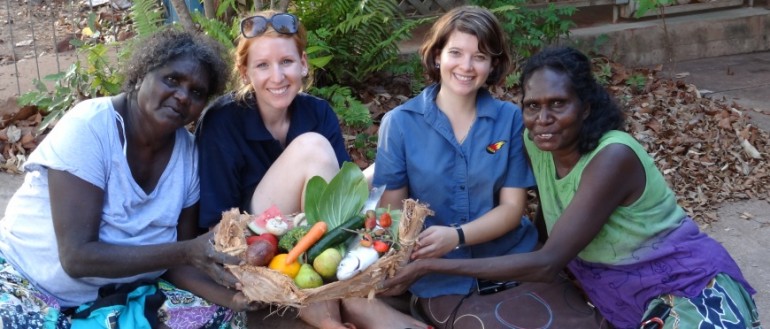Young blood
Menzies builds an Indigenous research team, brimming with youth and enthusiasm, in the Ngukurr community.
The circulation figures for the Ngukurr News were never likely to challenge those of the Victorian tabloid Herald Sun. Nevertheless, this humble little community newsletter was a great success.
That’s because Aboriginal people living in a remote community in South East Arnhem Land learnt to write articles, take photos, and produce a newsletter.
Developing these practical skills is important, but developing the self-confidence which comes from having a crack at something and making it work might be even more valuable.
The community of Ngukurr (pronounced ‘nooker’) is out in the sticks. This settlement of 1,700 people is 630 kilometres away from Darwin, east of Katherine on the Roper Highway. A four-wheel drive is the best bet on the Roper, particularly during the heavy rains of the Top End’s wet season.
There are roughly 120 houses in Ngukurr together with a school, store, medical clinic, and police station. Life is not always easy here. But there are young people with initiative. There are reasons to believe in a bright future, as the community responds to its challenges, with support from organisations like the Menzies School of Health Research (Menzies), and specifically it’s new Centre for Child Development and Education (CCDE).
The Centre’s Dr Kate Senior, spent four years at Ngukurr from 1999, engaged on research examining the social impacts of a mining venture in the region. “The community was quite pro-active in saying to the mining company that if they were going to mine then they had a responsibility to make improvements in the community,” remembers Dr Senior.
“The really positive thing that came out of the project was that we had funding for local research assistants. We had a lot of young people involved, and the project became centred on developing the skills of those people to be involved in research. The Ngukurr News was created as a focal point for these young people to gain new skills and to disseminate information about the project.
One of the original research assistants in the project Daphne Daniels is today a key member of the community’s major decision making body, the Yugal Mangi Development Corporation. Daphne is also an elected member of the Roper Gulf Shire Council and has been involved on the Sunrise Health Service Board, which delivers primary health care services across the South East Arnhem region.
Happily, all of the researchers engaged on the 1999 project are fully employed – no mean feat when unemployment rates in many communities remain disturbingly high.
Today Ngukurr is again at the centre of a proposed mining development, with Western Desert Resources exploring the viability of an iron-ore mine.
There will be opportunities for a local workforce, as long as people have the literacy levels necessary to understand policies like occupational health and safety guidelines. Research will again need to be undertaken to monitor the effects of the project.
Following the completion of the large research project in 2004, the experience of the community has been of researchers coming and going, without providing much feedback. The community has now expressed a preference for a more sustained relationship with a research organisation, and Dr Senior’s long association with Ngukurr, together with the respect she enjoys amongst community leaders makes Menzies’ Centre for Child Development and Education a logical choice.
“I’m interested in building a sustained engagement with the communities like Ngukurr,” says Dr Senior. “At CCDE our researches are investigating the critical areas of adolescent health and wellbeing, particularly in the context of social media, which is making deep inroads in the bush.”
The people of Ngukurr have encouraged the involvement of CCDE in a project that will see a research team embedded in the community and responding to community needs. “This approach helps young people to develop the initiative to think about opportunities and see possibilities,” Dr Senior observes. “It nurtures the confidence and the critical faculties that will be needed by the leaders of the next generation.”
The Ngukurr News may no longer be published, but the skills gained by those who worked on the paper are alive and well. With the generous support of organisations like the Ian Potter Foundation, the Menzies’ Centre for Child Development and Education looks forward to supporting the community of Ngukurr as they craft the future chapters of their story.

